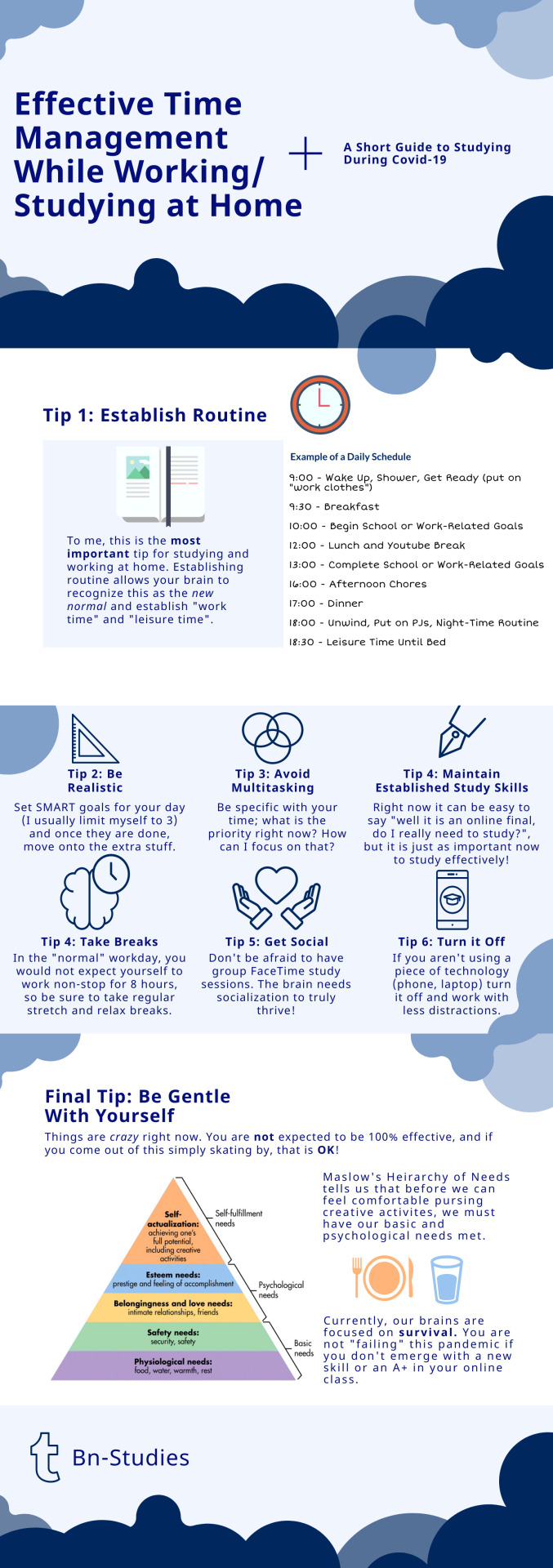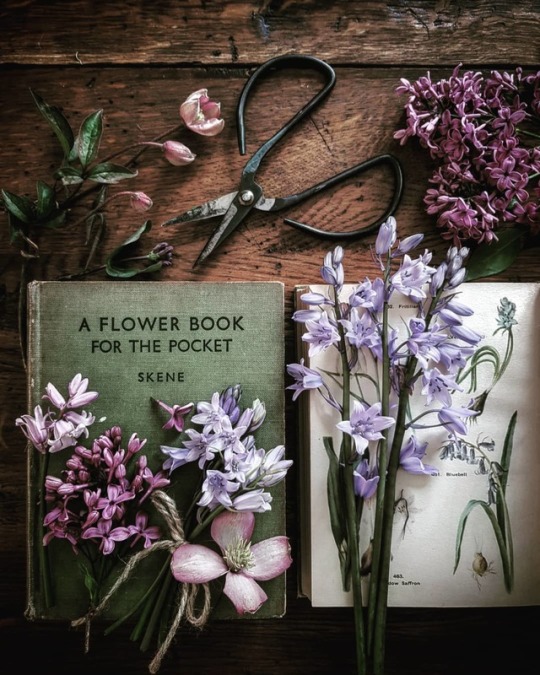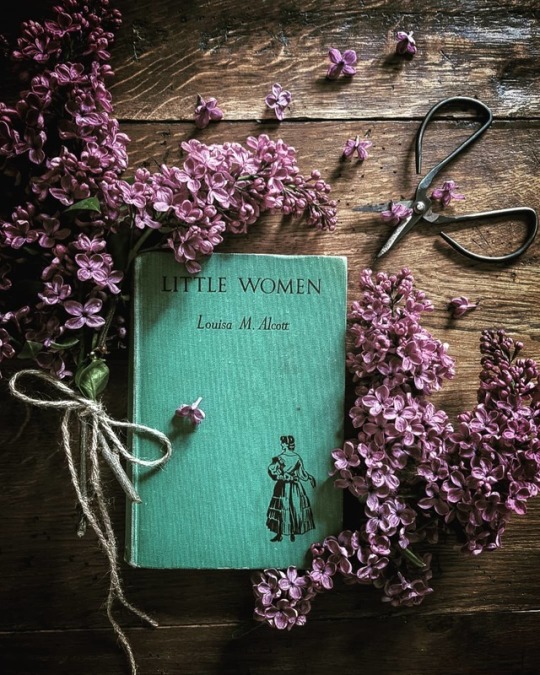Photo

I write notes in similar ways for all three of my subjects: maths, economics and history. In this post you’ll see an example for each of my subjects and an explanation of how, when and why I take notes for each subject. My general principles are to space them out so you can revise from them, use two colours, make them neat and contain only relevant information.
Economics:
I take notes for Economics at the end of each chapter in the textbook and write them using online websites (linked in my How to Study: Economics masterpost), my textbook and my class notes. I write key words in a different colour using a Staedtler Triplus Fineliner. I draw graphs where possible as I’m a visual learner. I try to space things out a bit more (as is on the right sheet of paper) so it’s easier to revise from.
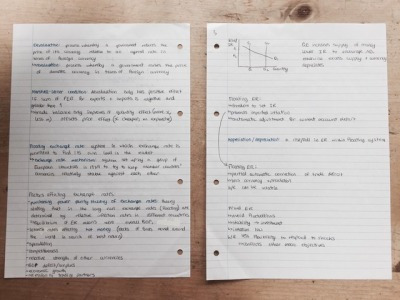
Maths:
As detailed in my How to Study: Maths masterpost, I make notes to consolidate my understanding of maths and create an easy resource with examples for me to look at in the future. I draw graphs, diagrams and write examples down where possible and write important equations in a different colour. I write these notes at the end of each chapter in my textbook.
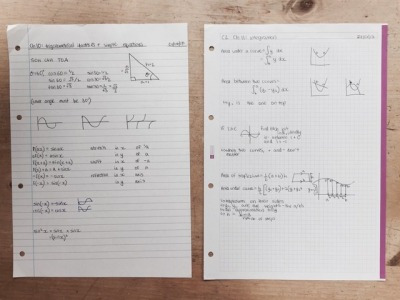
History:
As history is the subject with the most content to learn and the least amount of graphs, it’s harder to make these notes pleasing to the eye so I try to use more colour and keep the amount of words on each line to the bare minimum. For example, on the right sheet of paper I’ve tried to limit the amount of words on each line so the page doesn’t look so full. However unfortunately sometimes this isn’t possible, as is on the left sheet of paper where there is lots of information to write down. I write these notes again at the end of each chapter in the textbook.
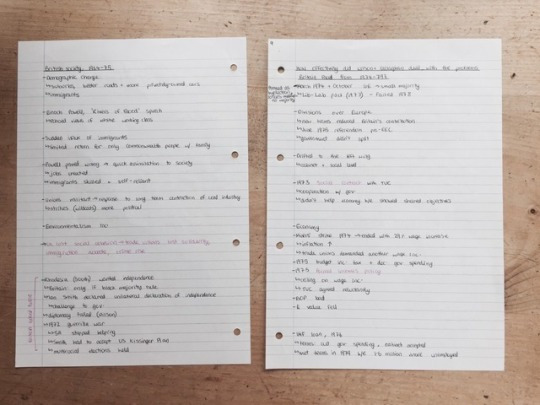
I hope you enjoyed reading this post and do let me know if you have any further questions or comments about how I write notes and study!
539 notes
·
View notes
Photo
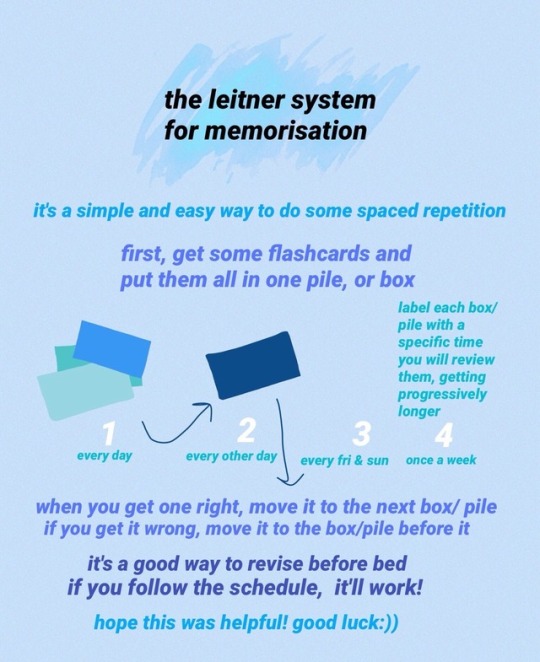
using the leitner system for memorisation
study tips 1/??
some of you hadn’t heard of this technique, so i thought i’d share it with you guys :))
what else would you like tips/advice on? leave me an ask!
i hop you’re having a great and productive day!
lots of love,
-jasmine
744 notes
·
View notes
Text
Studying with anxiety/depression
Today I wanted to share some tips on how to make studying easier despite mental illness. I chose to mention anxiety and depression specifically because it’s what I have experience with.
Give yourself time -I know this one is easier said than done, especially when your illness makes you procrastinate. But this will help you fight overwhelm so much I promise. Try to start doing things as soon as you can. Talk yourself into starting. Just starting, nothing more.
Divide tasks into smaller chunks -If you give yourself time, then you can work small piece by piece. Writing 10 page essay is overwhelming as hell but knowing you have to write a few words per day or just do research will help you dial the feelings down a bit.
Just start -Tell yourself you have to do this just for 5 minutes. Just 5 minutes. Nothing bad can happen to you in 5 minutes. This will get you started and once you’re in it and going, you should be able to continue for a lot longer.
Something is better than nothing -You might not be able to memorise all 20 pages or write the entire essay right now, but if you start and learn one page or write half a page, you’re already moving forward.
Done is what we’re going for -Just get it done. Not perfect, not even good. Just done. Because sometimes it’s the best thing you can do for yourself.
It’s never as important as it seems -Things always seem huge and scary but ultimately, it’s never that bad. Hell, if you really zoom out you’ll realise the most important thing is just staying alive and a bad grade isn’t going to kill you.
Priotitize -Sometimes you just won’t have the energy to do everything, so pick the most important ones and leave the rest. You might come back to it later, you might not.
Ask for help if you need it -Ask teachers, ask friends. Know you’re not alone.
Be kind to yourself -Do not beat yourself up over failing things or feeling like you’re not doing as well as others. Just realise that unlike healthy people, you’re dragging this huge boulder. Sometimes lighter, sometimes heavier, but it’s always an extra weight. And yet you’re running the same race and you’re surviving. You should be proud of yourself.
Relax properly -Make time for yourself. Do things that doesn’t involve mindless scrolling. Get all the rest you need.
I hope I helped and have an amazing weekend.
8K notes
·
View notes
Text
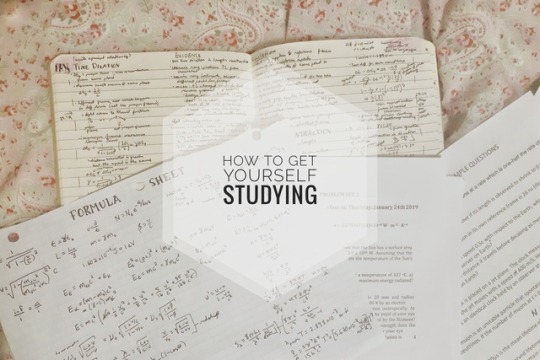
How to Get Yourself Studying, when you’ve got midterms coming up and you don’t feel like it
(here: referring to my physics and chem midterms. Applicable to other courses possibly as well)
1. Do the practice midterm under ‘exam conditions’.
Timed, no notes, phone on silent. Do your best. Once time is up: note what you don’t know, what you would have looked up had you had notes at hand.
2. Grade this practice midterm. Harshly.
This is what you’re gonna get with your current level of recall/knowledge. Acceptable? Probably not. You want to do better than this.
3. Identify what you don’t know.
The stuff you wanted to look up earlier? Study that now. Figure out how to do the stuff you couldn’t. Note what was missing from your head; get it into your head.
4. Do practice problems.
Like the practice midterm. Try to do it without notes. Look up the answer as you go along to correct right away. Note the steps to the problem, how you’d approach a similar problem.
5. Go over your notes.
Type up your notes (should have done this earlier but things happen and don’t get done). Read over your notes, mildly mind-mapping along the way; noting on a separate sheet of paper, by hand, points to remember, grouping concepts, clearing things up.
6. Google concepts you don’t understand.
Sometimes, the prof just isn’t great, the notes aren’t great, and the textbook (if there even is one) isn’t great. Find yourself on wikipedia trying to understand concepts. Find videos to explain it to you. If you just don’t get it, can’t find an answer, (why would the star appear to move when eddington confirmed general relativity with the eclipse?? I might never know), move on and hope that precise point is not questioned on the exam.
7. Make a comprehensive mindmap.
Condense the whole course material as much as possible, on as little number of sheets of paper as possible. All the stuff you would remember if you were a god-tier student, going above and beyond. Do not give yourself stress about not having it all down perfectly: going above and beyond is not usually necessary to get even an A.
8. Look at what you now know how to do compared to where you were before you studied, at step 1. Look. You did it. You studied. You’re already better off than you were earlier.
9. Lower your expectations.
In case the exam ends up being way out of bounds and unfair, and/or your brain yeets out of this dimension and is not in the right place while you’re sitting it. Expect maybe just a mere pass. Let yourself be satisfied with a C. (Still study for an A though)
*4-7 are interchangeable. Don’t need to be done in that order, or at all. Decide depending on your priorities.
865 notes
·
View notes
Text
How to study for an exam when you really don’t know how to start
Clean your room/space, tidy your desk, make your space feel neat and focused. The space we are in means a lot, don’t confine yourself to a messy space.
Make sure you also feel ready. Freshly showered, has a good meal, did some movement-based activity. You can’t focus as easily if you feel all messy and uncomfy.
Put your work in order, what is most important? If you’re taking an exam over a specific topic i.e Biology, look for the most mentioned topics. Those will be what you study most. When I took AP Psych, I found the outline online that said what percentage of the test would be what topic, and studied those flashcards, notes, and videos.
Likewise, figure out how much you need to do every day to get done in time. If you have 20 chapters left in a book and each one is 15 pages then take 300 pages divided by how many days left (say 40) leaving 7.5 pages a day minimum.
Block out time to study. Make sure you have no distractions, phone on silent, friends know you’re unavailable. This is its own test, a test of focus!
Go to review days if you have them Your instructor should explain what’s on the exam and what is expected of you, and if you miss out on important details you’ll really notice later. It may seem like skipping gives you more time to study, but you’ll be at a disadvantage in the end.
If you feel yourself getting distracted, reading the passage with no recollection of the content, or about to slam your head into the table, take a break. Go for a short walk, get a snack, stretch, get a glass of water, have a little dance party. Breaks count as being productive, self-care is important.
Feel free to switch up your studying methods. Taking notes every day or reading chapter after chapter of a subject gets boring. Do flashcards, Draw or make a diagram. Studying the brain? Draw and label it. Use funky pens sticky notes. Varying your methods of study will not only help you grasp the material better, but it’ll keep you from getting bored.
Find a friend or join a study group. There are a lot at different universities or even just create your own with like-minded folks. You can even do one online like I do. There are many discords for this. I’m in one and it’s great to hold each other accountable and share goals.
You can also switch up your space. Everyone has a different type of place they work best. Maybe a library, cafe, park, bedroom, couch, restaurant. Don’t stay couped up.
Use apps like Tide, Forest, Flora, Quizlet and more. I seriously use these every day. Tide is my favorite, it incorporates white noise and nature sounds with a Pomodoro timer, as well as three settings for Focus, Relax, and Sleep.
Make studying aesthetically pleasing. Studyblrs are on to something here! You don’t need to have expensive things or show them off but have pens you like, fun highlighter and sticky notes. Pick out playlists of music that makes you feel focused.
Affirm and trust yourself! When you get that flashcard right? Heck yeah! You did it holy crap! Celebrate! Be proud of yourself. You worked hard, you deserve to feel good. Your best is good enough, and your best may vary day-to-day.
4K notes
·
View notes
Text
How to study:

Before classes:
1 - Have a good night of sleep.
- At least eight hours.
2 - Take some coffee before going to school.
- Always have a snack in your bag. (Don’t study hungry)
3 - Workout.
- I know it’s going to be hard, since most of you have to wake up so early, but working out will help you to make the most out of your day.
4 - Organize your bag the night before.
5 - Go through what you’ll be learning on the day.
- This way you will be prepared and you can take notes about your doubts on the subjects.
6 - Listen to a badass playlist on the way to school/college.
- It will boast your motivation.
7 - Drink a lot of water.
- That’s a tip to the whole day, actually. Always remember to take a bottle of water or tea to school/college.
During class:
1 - Sit in the front.
- You will understand more your teacher and be away from the noises that can take away your attention.
2 - Ask questions. (No matter how dumb you think they are.)
- Do not end a class with doubts. If you can’t ask during the class, take a note of your question on a sticker/notebook to ask later.
3 - Record the lectures.
4 - Put stickers on notes you will need to go over.
5 - Listen to your teacher.
- Be friendly with them.
- Write down their names and contacts (number, emails, social media).
6 - Taking notes on class!
- Don’t worry about it being pretty, just make it organized and understandable so you can go over and make real notes later.
- Always start with the subject title and date.
- Differentiate by color your teacher’s notes and yours. Put in red (or any other color you want, actually) the important things.
After class:
1 - Eat.
- You need to replace energy!
2 - Review everything you learned on the day you learned it.
3 - Complete your homework on the day you get it.
- Or start it, if the task is too big.
- NEVER FALL BEHIND!
4 - Dress comfy.
5 - Have office hours in case you didn’t understand something.
6 - Watch documentaries on the topic you are currently studying.
7 - Study 30 minutes (50 minutes at the very most) and stop for 10 minutes.
- Leave your study place when it’s break time.
8 - Turn off your phone or let it out of sight.
9 - Test yourself/talk out loud.
- Do practice questions!
10 - Taking notes after class!
- Organize your notes by color.
- Rewrite the informations with your own words.
- When writing the new notes, make it pretty if you can. (I think it motivates me to study, looking at something well made) Otherwhise, be simple and objective, focus on the most important things.
- Go over the class recording and read the books to compare with your class notes, to make sure you didn’t forget anything.
10K notes
·
View notes
Photo
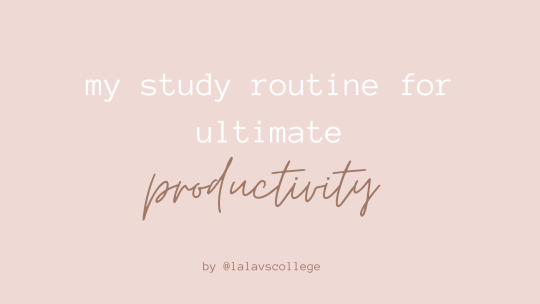
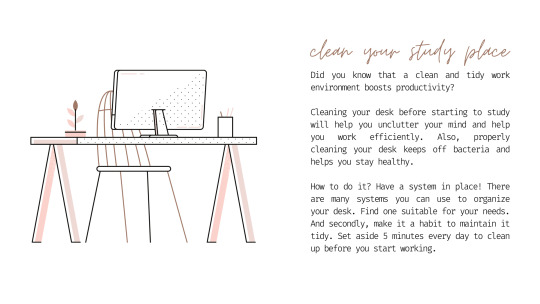
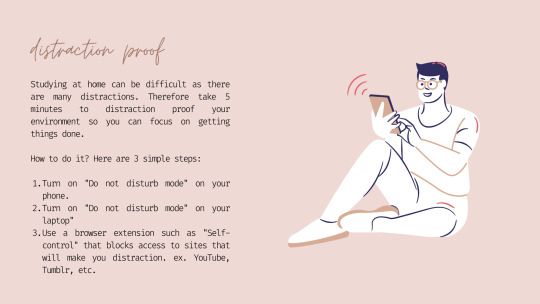
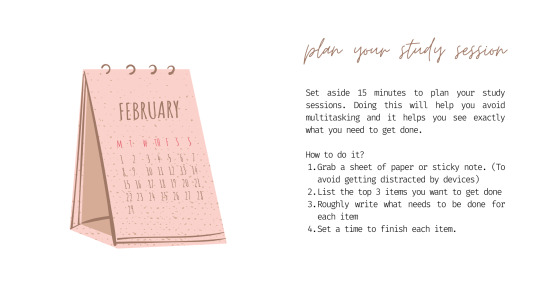
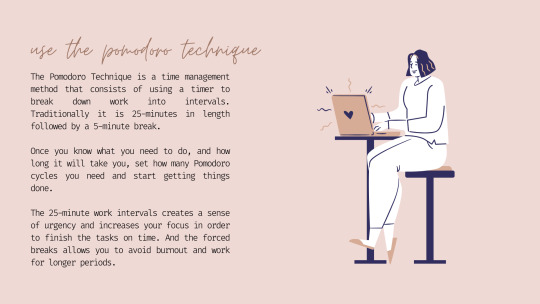
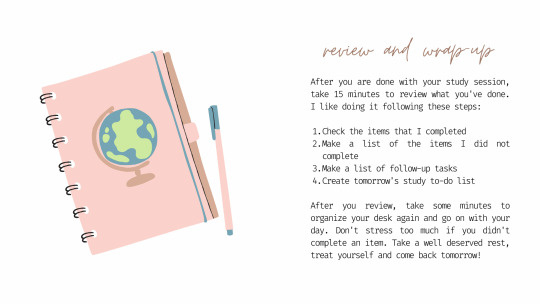
Hi, guys! Lala here. We all know the importance of having a morning and night routine, but I haven’t seen a lot of people talking about having a study routine. So I wanted to share mine with you and hopefully you guys can get some value out of it.
Do you have a study routine too or want to share some tips? Share them with me!
9K notes
·
View notes
Photo
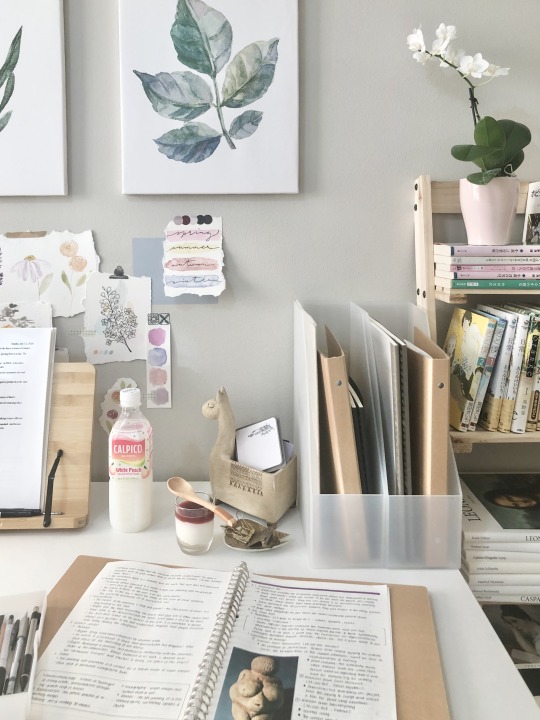
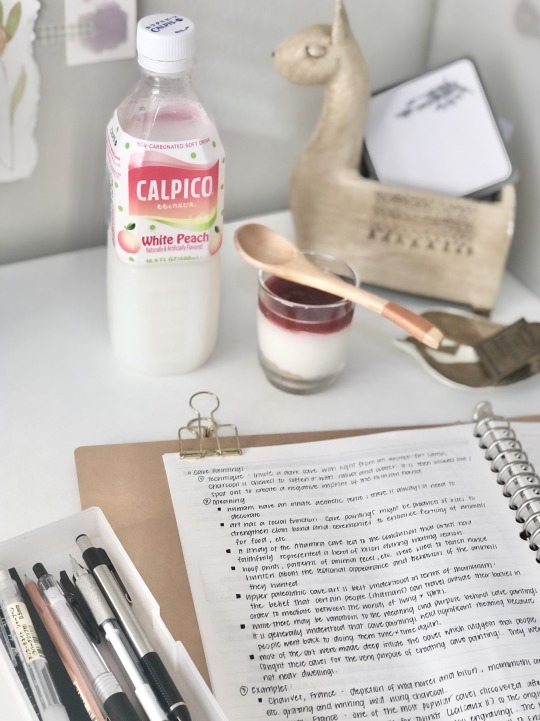
27.08.20 / i was enjoying a bit of quiet time this morning, repotting my haworthias so they can grow even bigger. after that, it was back to work as usual whille listening to upbeat tunes. how are you today? happy thursday! ♡
3K notes
·
View notes
Photo
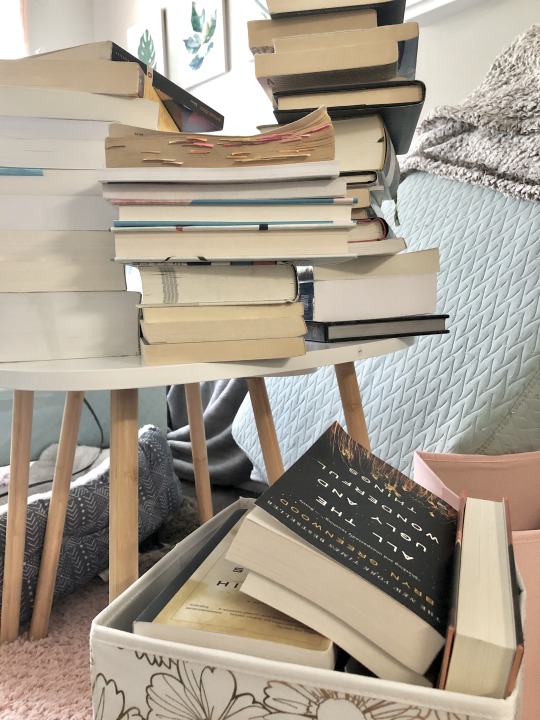

01.04.20 / It’s the beginning of a new month. I’m using this day to rearrange my study. It’s long overdue for a clean up anyway. Plus, organization and a revamped study space is always a motivational boost!
10K notes
·
View notes
Photo
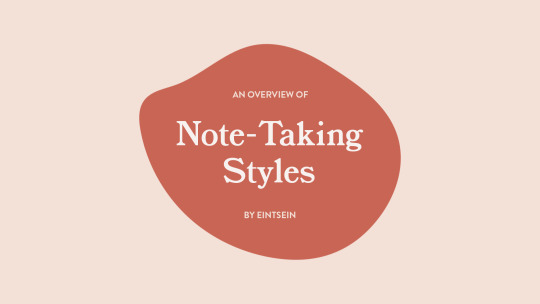

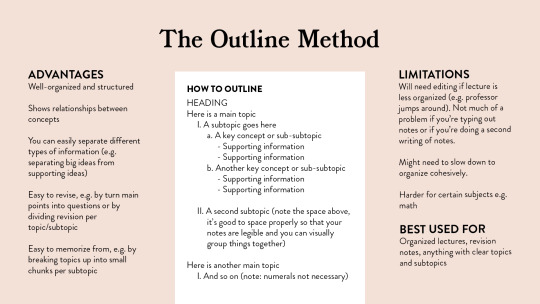
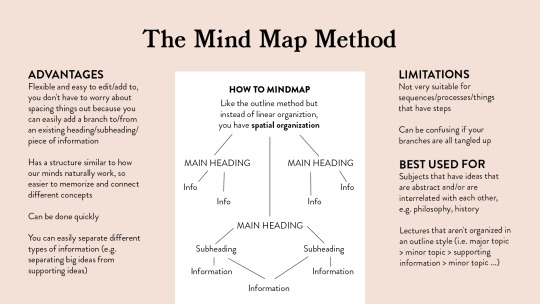

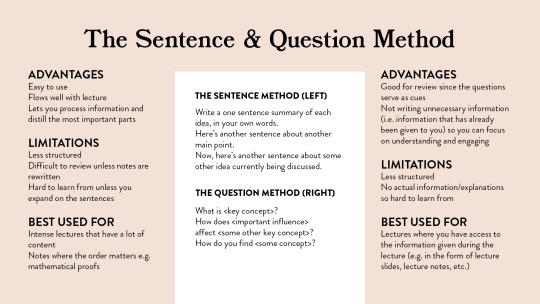
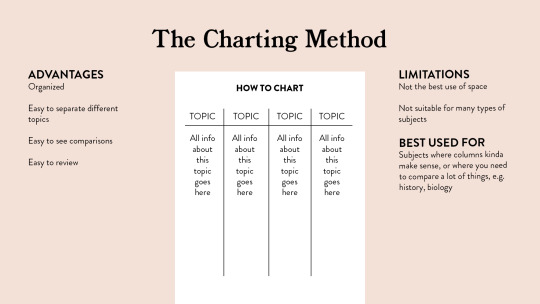


An Overview of Note-Taking Styles
Note-taking is one of the most essential skills a student should master. It allows you to record and review information to be used in the future. But what’s the best way to do so? Here’s an overview of note-taking styles that can help you maximize your learning!
56K notes
·
View notes
Text
vaguely academic things to do to keep yourself entertained
go down a wikipedia research hole by clicking the first term you don’t understand
binge a crashcourse series end to end (personal recs: world history, history of science, big history, philosophy)
find free books on project gutenberg
download some western classics for free
borrow books and audiobooks from the libby app or borrowbox
start a commonplace book
take a khan academy course
browse MIT’s free online course materials
teach yourself to code
go on a google scholar essay dive
try the open access button to avoid some paywalls for academic media, or install unpaywall that does a similar thing
research the history of the place you where you live
tempt the wrath of the duolingo owl and learn a language
search for online streams of the local tv in your target language’s country and use as background noise for immersion points
print and scrapbook favourite poetry and literature quotes
improve your handwriting by doing handwriting exercises
learn philosophy with the philosophize this! podcast. actually just check out all the educational spotify podcasts there are many good ones
start a weekly club with friends to share new and interesting things you’ve learnt that week
clean and reorganise your study space, physical or digital
check out online museums
fave educational youtube channels that I adore: vsauce, crashcourse, smarter every day, kurzgesagt, school of life, tom scott, r. c. waldun, vsauce3, primer, mark rober, veritasium, asapSCIENCE, scishow, TED-ed
hopefully you’ll find something to enjoy! happy learning x
34K notes
·
View notes
Quote
It’s a frightening thought, that in one fraction of a moment you can fall in the kind of love that takes a lifetime to get over.
Beau Taplin (via quotemadness)
2K notes
·
View notes
Photo

Helping Everyone: Four Tips for Delegating Without Hurting Team Productivity http://bit.ly/2t6JfrY
1 note
·
View note
Photo
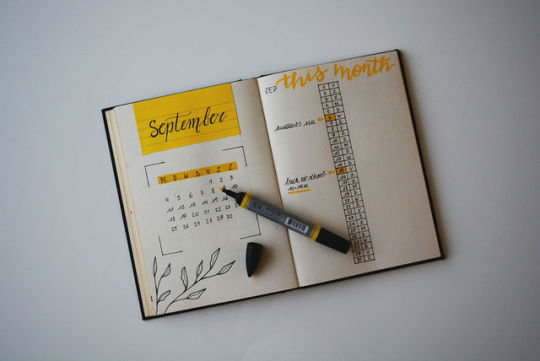
How the Bullet Journal Can Make You a More Productive Student http://bit.ly/2FSRalf
3 notes
·
View notes
